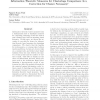Free Online Productivity Tools
i2Speak
i2Symbol
i2OCR
iTex2Img
iWeb2Print
iWeb2Shot
i2Type
iPdf2Split
iPdf2Merge
i2Bopomofo
i2Arabic
i2Style
i2Image
i2PDF
iLatex2Rtf
Sci2ools
104
click to vote
ICML
2009
IEEE
2009
IEEE
Information theoretic measures for clusterings comparison: is a correction for chance necessary?
Information theoretic based measures form a fundamental class of similarity measures for comparing clusterings, beside the class of pair-counting based and set-matching based measures. In this paper, we discuss the necessity of correction for chance for information theoretic based measures for clusterings comparison. We observe that the baseline for such measures, i.e. average value between random partitions of a data set, does not take on a constant value, and tends to have larger variation when the ratio between the number of data points and the number of clusters is small. This effect is similar in some other non-information theoretic based measures such as the well-known Rand Index. Assuming a hypergeometric model of randomness, we derive the analytical formula for the expected mutual information value between a pair of clusterings, and then propose the adjusted version for several popular information theoretic based measures. Some examples are given to demonstrate the need and us...
ICML 2009 | Machine Learning | Set-matching Based Measures | Similarity Measures | Theoretic Based Measures |
| Added | 17 Nov 2009 |
| Updated | 17 Nov 2009 |
| Type | Conference |
| Year | 2009 |
| Where | ICML |
| Authors | Xuan Vinh Nguyen, Julien Epps, James Bailey |
Comments (0)

